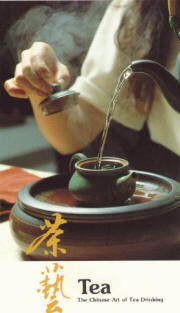Search
Related Articles
Sponsor Ad
Chinese Culture >> Chinese Food Articles >> Losing Weight with Wu Long Tea (Oolong)
Losing Weight with Wu Long (Oolong) Tea
I'm sure you've heard of Wu Long tea - the new weight-loss miracle. Well, the truth of the matter is that wu long tea is neither "new" nor "miraculous." It's been around for centuries and while it DOES have some weight loss properties wu long tea can be considered a dieting aid, but not the magic cure for obesity.
Wu Long tea is also known as "oolong" or "wulong." The different spellings result from the various ways the Chinese language can be written using the English (or more properly the "Roman") alphabet. The Chinese pronunciation of this tea sounds like "oo long."
Wu Long tea was first produced in the 15th century in China's Fujian province. It is a semi-oxidized tea, meaning that the tea leaves are allowed to partially oxidize after they are picked. Black tea is a fully oxidized tea and green tea is un-oxidized, so wu long tea has characteristics of both green and black tea.
In the 18th century people from Fujian province crossed the Taiwan Straight to settle on the island of Taiwan and brought with them their techniques for producing wu long tea. Taiwan proved to have ideal conditions for growing tea and now some of the finest wu long tea in the world comes from Taiwan.
 Wu Long Tea and Dieting
Wu Long Tea and Dieting
Wu Long tea has recently come into the spotlight as a weight loss drink. Some unscrupulous vendors have pounced on this publicity and promoted wu long tea as a "magic diet aid" that will shed extra pounds effortlessly.
As always, the truth is a little less dramatic. Scientific studies have shown that drinking wu long tea can raise the metabolism, and this in turn can burn extra calories. The effect is relatively slight - a 2003 Japanese study found that energy expenditure increased by 10% for a period of 2 hours after drinking wu long tea.
The metabolic increase is due to "polymerized polyphenols" which are more abundant in wu long tea than other types of tea. Wu long tea can also suppress lipid metabolism which has the effect of suppressing fatty accumulation and body weight increases. Another Japanese study concludes that long-term consumption of wu long tea is beneficial for the suppression of diet induced obesity.
Asian Diet
Wu Long tea is popular is many Asian countries, and some have made a link between the slim Asian physique and wu long tea consumption. While wu long tea undoubtedly plays a part in keeping Asians slim, a bigger part by far is the traditional Asian diet. The typical Asian diet is plant-based as opposed to the meat-protein diet of Western countries.
Asians typically have fewer chronic diseases such as heart disease, diabetes, and certain cancers. Asians also have longer life spans than Westerners. Diet certainly plays an important role in these differences.
Anyone who is seriously interested in losing weight and maintaining long term health is advised to take a take a close look at what keeps Asians slim and healthy. Wu long tea is part of that diet, but it also includes an abundance of plant foods, low fat consumption, low dairy food consumption, a moderate amount of fish and a small amount of poultry and eggs.
The traditional Asian diet is very low in red meat. As Western influences spread through Asia and more red meat is consumed there is a corresponding increase in "Western" disease such as coronary heart disease and some cancers.
Include Wu Long Tea in Your Diet
Anyone wanting to lose weight will benefit from daily consumption of wu long tea, but there is much more to it than that. Permanent weight loss can only be accomplished by permanent lifestyle changes. This means eating healthy foods and getting plenty of exercise. Wu long tea (which, by the way, is a delicious drink) can play an important part in that healthy lifestyle.
About the Author
Ross MacIver operates Tea from Taiwan, a website that offers first quality wu long tea direct from Taiwan. TeaFromTaiwan.com has a selection of fine wu long tea as well as information about the tea culture of Taiwan.
